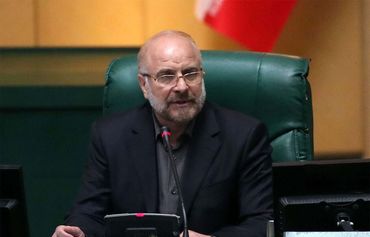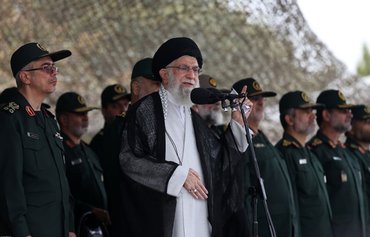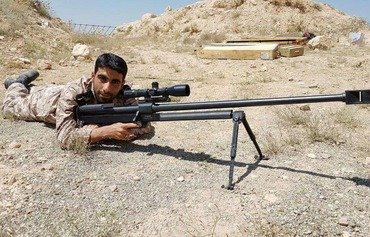Recent developments in Tehran have laid bare the degree to which the Islamic Revolutionary Guard Corps (IRGC) wields outsized influence over Iran's economy and the decisions of the country's leaders.
According to an investigative report published October 20 in Iranian daily Payam-e Ma, Tehran deputy mayor for social and cultural affairs Amin Tavakkolizadeh said "jihadi forces" -- meaning the IRGC -- "need to be added" to forces managing the city, and should help manage child labourers.
Child labourers, many of whom panhandle for large mafia-like groups, are periodically collected from the streets and released to social services in Tehran.
Earlier in October, Tehran City Council chairman Mehdi Chamran announced that the city's municipality had decided to commission all of its projects to the IRGC.
![A homeless child labourer is seen here in Tehran in winter 2019. [Sobh-e Rouyesh]](/cnmi_di/images/2021/10/26/32316-Child-labour-Tehran-600_384.jpg)
A homeless child labourer is seen here in Tehran in winter 2019. [Sobh-e Rouyesh]
![A group of homeless children on the outskirts of Tehran in winter 2019. [Pouya Journalists' Club]](/cnmi_di/images/2021/10/26/32317-tehran-children-homeless-600_384.jpg)
A group of homeless children on the outskirts of Tehran in winter 2019. [Pouya Journalists' Club]
While most projects in Tehran were allocated to the IRGC already, this exclusive deal allows the IRGC to monopolise the capital's economy -- Iran's largest.
Lion's share of economy
Reliable statistics and information are rare on any topic when it comes to the Iranian regime, and even less so with the IRGC; however, it is no secret that the IRGC is methodically taking over both the private and public sectors of the country's economy.
An estimate released in June 2020 by the IRGC's Khatam al-Anbiya Construction Headquarters shows the IRGC is involved in, owns or operates nearly 80% of all "economic projects" in Iran.
This includes transportation, water, construction, and oil and gas sector projects.
While Khatam al-Anbiya HQ itself released this information, the IRGC denies its influence in Iran's economy, stating that it is the government that asks it to manage its projects, simply because of its competence.
Many claim the IRGC has sought to extend its influence and steer the regime further towards fanaticism by doctoring parliamentary and presidential elections.
But holding more power means getting hit harder by sanctions targeting the IRGC's interventionist activities in the region. And when sanctions bludgeon the IRGC and its affiliates, the public also pays the price.
This has not deterred the IRGC from pursuing its regional agenda, however, even though the country is grappling with a sinking economy, sky high inflation and large-scale unemployment.
IRGC outbids other contenders
The government -- as well as the Tehran municipality -- claims to have selected the IRGC out of all bidders for projects, due to its efficiency.
But the IRGC has ties within the system and is able to outbid other contenders, since it has the most money. The executive branch is practically powerless when it comes to fulfilling the IRGC's demands, as Supreme Leader Ali Khamenei stands behind the IRGC.
Since the start of Ebrahim Raisi's presidency, an increasing number of government executives are IRGC veterans.
The bidding system for construction projects works to the IRGC's benefit, giving credence to a saying in the Iranian construction and civil engineering community that "if you don't work for the IRGC, you don't work".
Hamid Shahnavaz, a civil engineer whose large and once lucrative firm went bankrupt in 2020, said he has experienced this firsthand.
"Although the coronavirus outbreak exacerbated problems, the main reason for our bankruptcy was the IRGC takeover," he said. "It outbid us on every project, and it was only a matter of time before we would topple over."
"My partners and I were hopeful for a change, although we knew it was wishful thinking," Shahnavaz said. But over the course of three years, "things got worse for us as the IRGC undertook more and more projects".

![Iranian leader Ali Khamenei's face is omnipresent in Tehran, seen here on June 20 on signs in a shop at the Molavi bazaar in the south of the capital. Many say the ruling regime, established by Rouhollah Khomeini (pictured on the currency), is beholden to the IRGC, which helped bring it to power. [Atta Kenare/AFP]](/cnmi_di/images/2021/10/26/32315-Iran-Tehran-shoppers-600_384.jpg)






